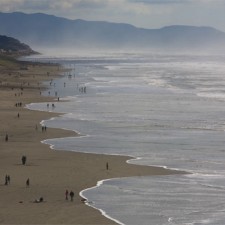Present and Future Oceans
What Will Happen to Our Oceans?
The oceans always have been in a state of change, but man-made drivers increasingly perturb the natural trajectory of the ocean and life within it. After just 200 years of global industrial activity and accelerated population growth, the effects of man’s activities on the ocean are apparent. The viability of many of the large fish of the oceans is threatened by overfishing and the effects of pollution.
Surface waters are getting warmer. The oceans are becoming more and more acidic as atmospheric CO2 increases and dissolves into the ocean. This will likely stress many crustaceans and organisms whose calcium-based shells are difficult to maintain in the increasingly acidic waters. All these factors suggest that in the coming decades we may see fundamental shifts in ocean biogeochemical cycles and ecosystems.
By the middle of this century, sea level is projected to rise and possibly endanger coastal communities. The Arctic may experience ice-free summers. If current fishing practices continue, there may be few large fish swimming in the oceans. How will the changing ocean feed back on to the processes that regulate climate and how will ocean ecosystems be changed? How resilient is the ocean and are we putting at risk the support systems it provides for mankind?
Researchers at MIT and WHOI are developing the tools to observe and quantify the changing ocean in all its aspects—physical, chemical, and biological. We are trying to understand how the ocean works as a system and how it couples with the rest of the climate system. In pursuit of answers, we are developing models that describe the ocean, and we are using that knowledge to make informed judgments about how the ocean will evolve.





